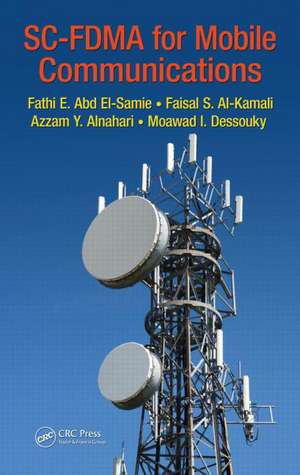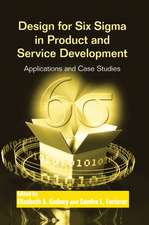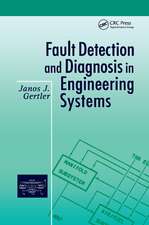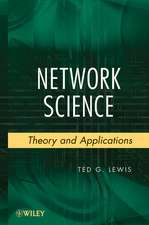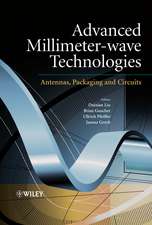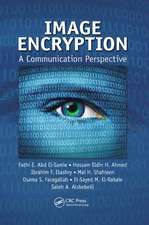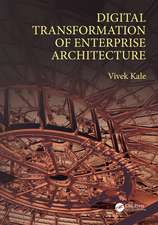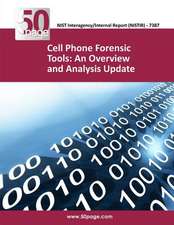SC-FDMA for Mobile Communications
Autor Fathi E. Abd El-Samie, Faisal S. Al-kamali, Azzam Y. Al-nahari, Moawad I. Dessoukyen Limba Engleză Hardback – 3 iul 2013
The book explores the emerging trend of cooperative communication with SC-FDMA and how it can improve the physical layer security. It considers the design of distributed coding schemes and protocols for wireless relay networks where users cooperate to send their data to the destination.
Supplying you with the required foundation in cooperative communication and cooperative diversity, it presents an improved Discrete Cosine Transform (DCT)-based SC-FDMA system. It introduces a distributed space–time coding scheme and evaluates its performance and studies distributed SFC for broadband relay channels.
- Presents relay selection schemes for improving the physical layer
- Introduces a new transceiver scheme for the SC-FDMA system
- Describes space–time/frequency coding schemes for SC-FDMA
- Includes MATLAB® codes for all simulation experiments
| Toate formatele și edițiile | Preț | Express |
|---|---|---|
| Paperback (1) | 270.80 lei 43-57 zile | |
| CRC Press – 12 oct 2017 | 270.80 lei 43-57 zile | |
| Hardback (1) | 786.60 lei 43-57 zile | |
| CRC Press – 3 iul 2013 | 786.60 lei 43-57 zile |
Preț: 786.60 lei
Preț vechi: 1062.63 lei
-26% Nou
Puncte Express: 1180
Preț estimativ în valută:
150.54€ • 156.58$ • 124.28£
150.54€ • 156.58$ • 124.28£
Carte tipărită la comandă
Livrare economică 14-28 aprilie
Preluare comenzi: 021 569.72.76
Specificații
ISBN-13: 9781466510715
ISBN-10: 1466510714
Pagini: 382
Ilustrații: 138 b/w images, 19 tables and 299 eauation lines
Dimensiuni: 156 x 234 x 25 mm
Greutate: 0.68 kg
Ediția:New.
Editura: CRC Press
Colecția CRC Press
ISBN-10: 1466510714
Pagini: 382
Ilustrații: 138 b/w images, 19 tables and 299 eauation lines
Dimensiuni: 156 x 234 x 25 mm
Greutate: 0.68 kg
Ediția:New.
Editura: CRC Press
Colecția CRC Press
Public țintă
Academic and Professional Practice & DevelopmentCuprins
Introduction. DFT-SC-FDMA System. DCT-SC-FDMA System. Transceiver Schemes for SC -FD MA Systems. Carrier Frequency Offsets in SC-FDMA Systems. Equalization and CFO s Compensation for MIMO SC-FDMA Systems. Fundamentals of Cooperative Communications. Cooperative Space–Time /Frequency Coding Schemes for SC-FDMA Systems. Relaying Techniques for Improving the Physical Layer Security.
Notă biografică
Fathi E. Abd El-Samie received his BSc (Honors), MSc, and PhD from Menoufia University, Menouf, Egypt, in 1998, 2001, and 2005, respectively. Since 2005, he has been a teaching staff member with the Department of Electronics and Electrical Communications, Faculty of Electronic Engineering, Menoufia University. He currently serves as a researcher at KACST-TIC in Radio Frequency and Photonics for the e-Society (RFTONICs). He is a coauthor of about 200 papers in international conference proceedings and journals and of 4 textbooks. His research interests include image enhancement, image restoration, image interpolation, super-resolution reconstruction of images, data hiding, multimedia communications, medical image processing, optical signal processing, and digital communications. Dr. Abd El-Samie received the Most Cited Paper Award from the Digital Signal Processing journal in 2008.
Faisal S. Al-Kamali received his BSc in electronics and communications engineering from the Faculty of Engineering, Baghdad University, Baghdad, Iraq, in 2001. He received his MSc and PhD in communication engineering from the Faculty of Electronic Engineering, Menoufia University, Menouf, Egypt, in 2008 and 2011, respectively. He joined the teaching staff of the Department of Electrical Engineering, Faculty of Engineering and Architecture, Ibb University, Ibb, Yemen, in 2011. He is a coauthor of several papers in international conferences and journals. His research interests include CDMA systems, OFDMA systems, single-carrier FDMA (SC-FDMA) system, MIMO systems, interference cancellation, synchronization, channel equalization, and channel estimation.
Azzam Y. Al-nahari received his BSc in electronics and communications engineering from the University of Technology, Baghdad, Iraq. He received his MSc and PhD from Menoufia University, Egypt, in 2008 and 2011, respectively. He was also a postdoctoral fellow in the Department of Electrical and Information Technology, Lund University, Sweden. He currently serves as an assistant professor in the Department of Electrical Engineering, Ibb University, Yemen. His research interests include MIMO systems, OFDM, cooperative communications and physical layer security.
Moawad I. Dessouky received his BSc (Honors) and MSc from the Faculty of Electronic Engineering, Menoufia University, Menouf, Egypt, in 1976 and 1981, respectively, and his PhD from McMaster University, Canada, in 1986. He joined the teaching staff of the Department of Electronics and Electrical Communications, Faculty of Electronic Engineering, Menoufia University, Menouf, Egypt, in 1986. He has published more than 200 scientific papers in national and international conference proceedings and journals. He currently serves as the vice dean of the Faculty of Electronic Engineering, Menoufia University. Dr. Dessouky received the Most Cited Paper Award from Digital Signal Processing journal in 2008. His research interests include spectral estimation techniques, image enhancement, image restoration, super-resolution reconstruction of images, satellite communications, and spread spectrum techniques.
Faisal S. Al-Kamali received his BSc in electronics and communications engineering from the Faculty of Engineering, Baghdad University, Baghdad, Iraq, in 2001. He received his MSc and PhD in communication engineering from the Faculty of Electronic Engineering, Menoufia University, Menouf, Egypt, in 2008 and 2011, respectively. He joined the teaching staff of the Department of Electrical Engineering, Faculty of Engineering and Architecture, Ibb University, Ibb, Yemen, in 2011. He is a coauthor of several papers in international conferences and journals. His research interests include CDMA systems, OFDMA systems, single-carrier FDMA (SC-FDMA) system, MIMO systems, interference cancellation, synchronization, channel equalization, and channel estimation.
Azzam Y. Al-nahari received his BSc in electronics and communications engineering from the University of Technology, Baghdad, Iraq. He received his MSc and PhD from Menoufia University, Egypt, in 2008 and 2011, respectively. He was also a postdoctoral fellow in the Department of Electrical and Information Technology, Lund University, Sweden. He currently serves as an assistant professor in the Department of Electrical Engineering, Ibb University, Yemen. His research interests include MIMO systems, OFDM, cooperative communications and physical layer security.
Moawad I. Dessouky received his BSc (Honors) and MSc from the Faculty of Electronic Engineering, Menoufia University, Menouf, Egypt, in 1976 and 1981, respectively, and his PhD from McMaster University, Canada, in 1986. He joined the teaching staff of the Department of Electronics and Electrical Communications, Faculty of Electronic Engineering, Menoufia University, Menouf, Egypt, in 1986. He has published more than 200 scientific papers in national and international conference proceedings and journals. He currently serves as the vice dean of the Faculty of Electronic Engineering, Menoufia University. Dr. Dessouky received the Most Cited Paper Award from Digital Signal Processing journal in 2008. His research interests include spectral estimation techniques, image enhancement, image restoration, super-resolution reconstruction of images, satellite communications, and spread spectrum techniques.
Descriere
This book examines Single-Carrier Frequency Division Multiple Access (SC-FDMA). Exploring the emerging trend of cooperative communication and how it can improve the physical layer security, it considers the design of distributed coding schemes and protocols for wireless relay networks where users cooperate to send their data to the destination. It also proposes a cooperative diversity protocol implementing space-time coding for an arbitrary number of relay nodes with Amplify-and-Forward (AF) protocol.
